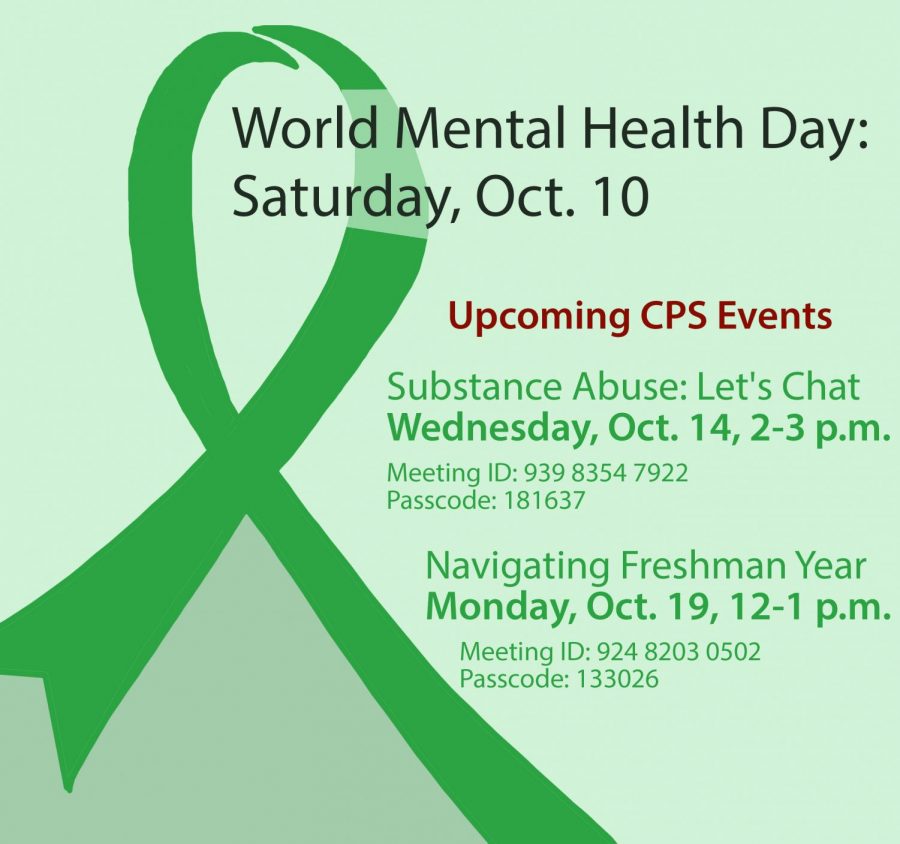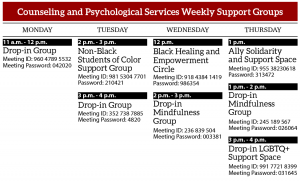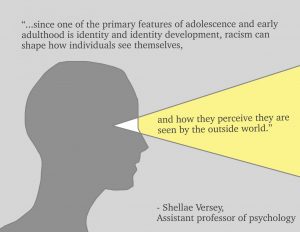Navigating Mental Health Amid a Pandemic
October 15, 2020
The COVID-19 pandemic and resulting economic recession have negatively impacted people’s mental health and well-being around the world. Oct. 11 marked World Mental Health Day, a holiday bringing awareness to and educating people about the importance of mental health, especially during a pandemic.
Suicidal ideation has reached a record high among college students, who are especially at risk of anxiety, depression and suicide. Suicide is the second most common cause of death among college students, with approximately 1,100 students dying by suicide every year. The American College Health Association found that the suicide rate of young adults ages 15-24 has tripled since the 1950s.
Compared to normal times, college students are more stressed now due to online school, the upcoming presidential election and the ongoing Black Lives Matter movement, all of which are occurring during a pandemic. The pandemic is putting students at a greater risk of becoming suicidal, depressed or anxious as people may be experiencing feelings of hopelessness, grief and social disconnection more than usual.
Over the years, college students have expressed their hesitation to seek help; there are many self-reported barriers and fears due to the stigma around mental health.
The work to normalize mental health issues should never be relegated to a day, month or time of crisis. It’s a constant, ongoing effort toward acceptance and unwavering support.
According to the National Center for Biotechnology Information, some of the reported barriers to receiving assistance include the perception that treatment is not needed, a lack of time, trusting in one’s ability to self-manage and social stigma.
Dr. Jeffrey Ng, director of Counseling and Psychological Services (CPS), emphasized that having a platform where students can share their experiences is very important because “it normalizes vulnerability and help-seeking and combating stigma, social disconnection and helplessness/hopelessness.”
During the pandemic, it is especially important to be aware of the warning signs of suicidal ideation in order to promote a more cognizant world for those impacted by stressors. World Mental Health Day is meant to raise awareness about this issue, and an even more pointed effort was made just last month.
In honor of National Suicide Prevention and Awareness Month, which took place during September, CPS conducted a social media campaign on Instagram for the community to share reasons for living as a way of standing in solidarity with one another.
This campaign was managed by undergraduate wellness promotion interns at the office. They received about 35 responses through the question feature on Instagram. The responses included “my family,” “the people that surround me,” “to support my friends and family and see them grow,” “to have hope that better things are coming” and “to have a story to tell.”
Additionally, CPS held a moment of silence through Zoom in remembrance of college students who died by suicide this year. Under normal circumstances, this campaign would have occurred in person through tabling efforts on both campuses.
Ng noted other CPS-sponsored efforts to provide students with mental health support. CPS offers regular workshops addressing different student stressors like managing impostor syndrome, handling stress and anxiety during the pandemic, maximizing student-family communications, and providing support for international and law school students.
The vulnerabilities that students usually experience due to the sociopolitical climate, social media and identity-based stress are further exacerbated by the pandemic and the resulting lack of in-person interaction. Neural networks that are activated with in-person contact are not activated through a screen, which can hinder well-being, wellness, happiness and compassion. This gives rise to anxiety as students lose their means of social contact and intimacy.
From social isolation to political pressures, the current climate provides a perfect storm of factors that intensify mental health issues. Events like World Mental Health Day and the series offered by CPS during Suicide Awareness Month aim to equip students with healthy coping mechanisms. While this is a step in the right direction, the work to normalize mental health issues should never be relegated to a day, month or time of crisis. It’s a constant, ongoing effort toward acceptance and unwavering support.
If you are experiencing mental health issues, please contact the following resources:
Fordham University Counseling and Psychological Services at Lincoln Center: 1-212-636-6225
If you or someone you know is at risk of suicide, please contact the number below immediately.
National Suicide Prevention Lifeline (NSPL)
1-800-273-TALK (8255)
Fordham University, President McShane and The Observer encourage Fordham students to reach out for support or to get help on campus by contacting the numbers listed below.
Counseling Center:
Rose Hill: (718) 817-3725
Lincoln Center: (212) 636-6225
Campus Ministry:
Rose Hill: (718) 817-4500
Lincoln Center: (212) 636-6267
Students may also contact a commuter assistant, resident assistant or resident director at any time to request assistance or to talk, and can contact Public Safety at (718) 817-2222 for assistance at any time.














